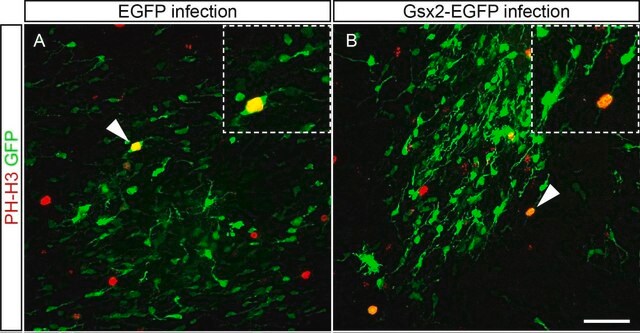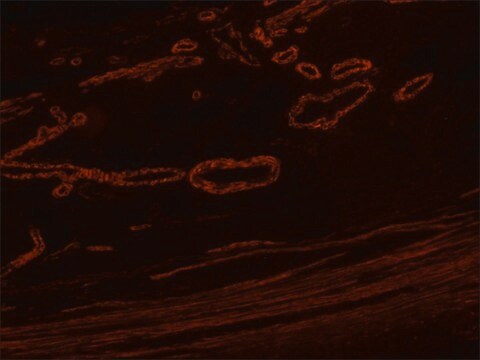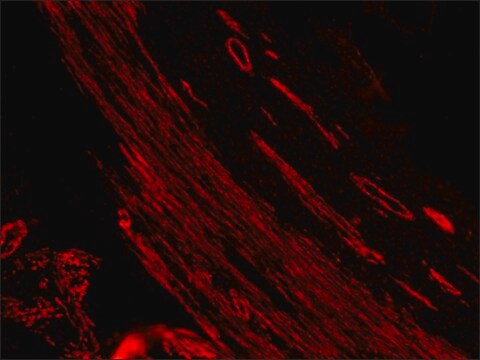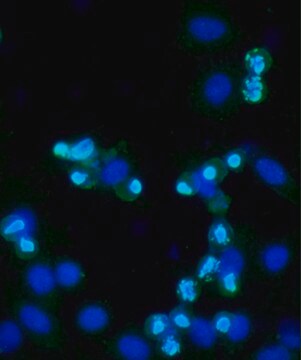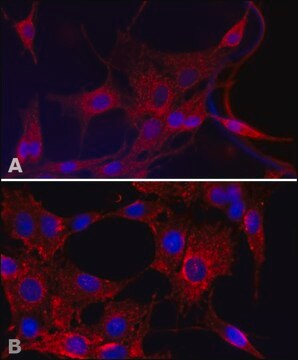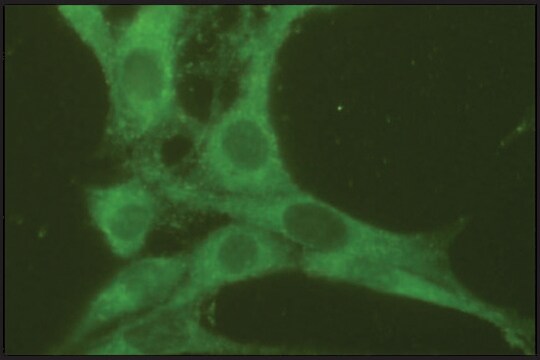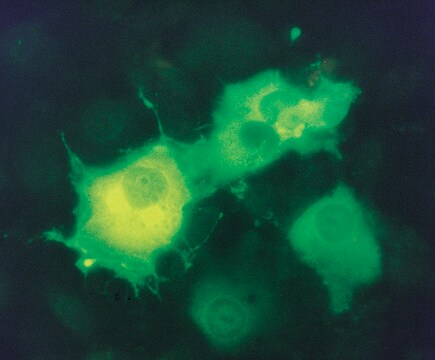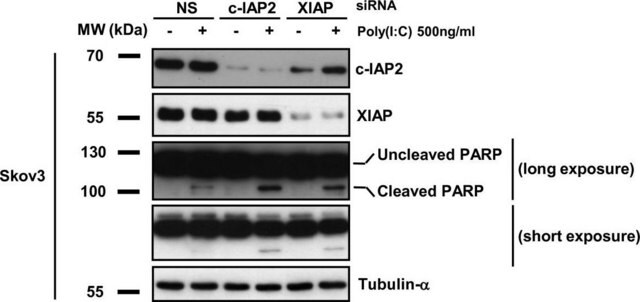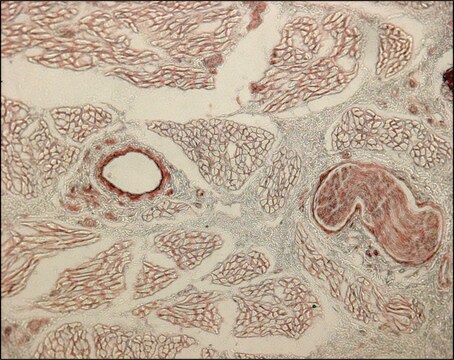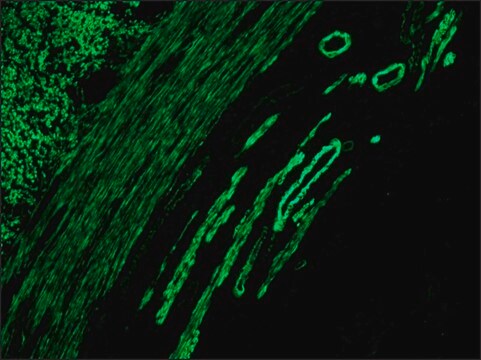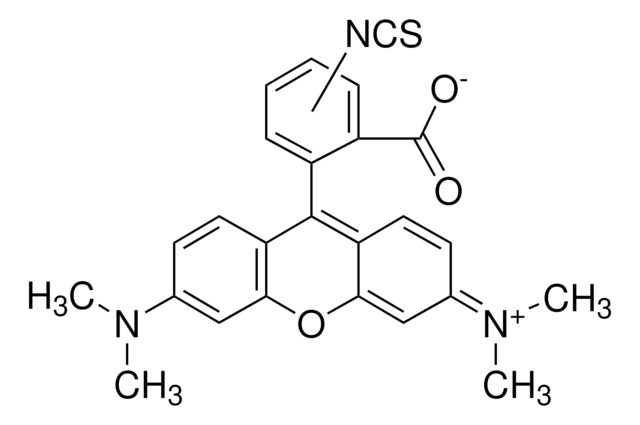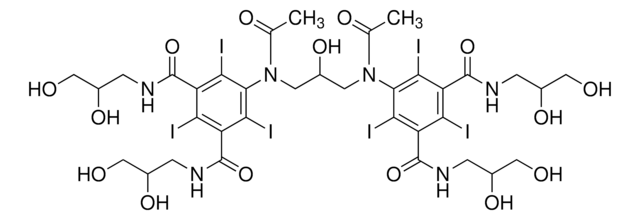T5393
Anti-Mouse IgG (whole molecule)−TRITC antibody produced in goat
IgG fraction of antiserum, buffered aqueous solution
Sinónimos:
Goat Anti-Mouse IgG (whole molecule)−Tetramethylrhodamine isothiocyanate
Iniciar sesiónpara Ver la Fijación de precios por contrato y de la organización
About This Item
Productos recomendados
biological source
goat
Quality Level
conjugate
TRITC conjugate
antibody form
IgG fraction of antiserum
antibody product type
secondary antibodies
clone
polyclonal
form
buffered aqueous solution
technique(s)
direct immunofluorescence: 1:64
storage temp.
2-8°C
target post-translational modification
unmodified
General description
IgG antibody subtype is the most abundant serum immunoglobulins of the immune system. It is secreted by B cells and is found in blood and extracellular fluids and provides protection from infections caused by bacteria, fungi and viruses. Maternal IgG is transferred to fetus through the placenta that is vital for immune defense of the neonate against infections.
Anti-Mouse IgG (whole molecule)-TRITC antibody is specific for mouse IgG and all subclasses, it cross reacts with mouse IgA and IgM. Antibody purification is by ion exchange chromatography after which it is conjugated to crystalline tetramethylrhodamine isothiocyanate (TRITC).
Anti-Mouse IgG (whole molecule)-TRITC antibody is specific for mouse IgG and all subclasses, it cross reacts with mouse IgA and IgM. Antibody purification is by ion exchange chromatography after which it is conjugated to crystalline tetramethylrhodamine isothiocyanate (TRITC).
Whole antiserum is fractionated and then further purified by ion exchange chromatography to provide the IgG fraction of antiserum. This fraction is essentially free of other goat serum proteins. The antibody is conjugated to crystalline tetramethylrhodamine isothiocyanate (TRITC) and then further purified to remove free TRITC. Specificity for mouse IgG is determined by Ouchterlony Double Diffusion (ODD). The antibody preparation is specific for mouse IgG and all subclasses, it cross reacts with mouse IgA and IgM. Identity and purity of the antibody is established by immunoelectrophoresis (IEP), prior to conjugation. Electrophoresis of the antibody preparation followed by diffusion against anti-goat IgG and anti-goat whole serum results in single arcs of precipitation in the γ region.
Specificity
The antibody preparation is specific for mouse IgG and all subclasses, it cross reacts with mouse IgA and IgM.
Immunogen
IgG isolated from pooled normal mouse serum
Application
Anti-Mouse IgG (whole molecule)-TRITC antibody may be used for immunofluorescence at a minimum antibody dilution of 1:64 using mouse spleen cells. Antibody dilution range of 1:50 to 1:250 was used for immunofluorescence in various studies.
Physical form
Solution in 0.01 M phosphate buffered saline, pH 7.4, containing 15 mM sodium azide
Disclaimer
Unless otherwise stated in our catalog or other company documentation accompanying the product(s), our products are intended for research use only and are not to be used for any other purpose, which includes but is not limited to, unauthorized commercial uses, in vitro diagnostic uses, ex vivo or in vivo therapeutic uses or any type of consumption or application to humans or animals.
¿No encuentra el producto adecuado?
Pruebe nuestro Herramienta de selección de productos.
Storage Class
10 - Combustible liquids
wgk_germany
WGK 3
flash_point_f
Not applicable
flash_point_c
Not applicable
Elija entre una de las versiones más recientes:
¿Ya tiene este producto?
Encuentre la documentación para los productos que ha comprado recientemente en la Biblioteca de documentos.
Los clientes también vieron
M B Graeber et al.
Journal of neuroscience research, 21(1), 18-24 (1988-09-01)
Axotomy of the rat facial nerve leads to mitotic divisions of microglial cells without developing into phagocytes. In order to study the functional characteristics of those activated, i.e., proliferating but nonphagocytic, microglia we investigated the expression of monocyte/macrophage antigens by
Masato Naraoka et al.
World neurosurgery, 129, e63-e72 (2019-05-18)
Early brain injury after subarachnoid hemorrhage (SAH), which is considered a main factor leading to poor outcome, is believed to be caused by the increase of intracranial pressure (ICP) and/or the presence of subarachnoid blood clots (SBC) itself. The purpose
W Qi et al.
Gene therapy, 21(1), 10-18 (2013-10-11)
The use of small-interfering RNA (siRNA) has great potential for the development of drugs designed to knock down the expression of damage- or disease-causing genes. However, because of the high molecular weight and negative charge of siRNA, it is restricted
Barbara Testoni et al.
Nucleic acids research, 34(3), 928-938 (2006-02-14)
p63 is a developmentally regulated transcription factor related to p53, which activates and represses specific genes. The human AEC (Ankyloblepharon-Ectodermal dysplasia-Clefting) and EEC (Ectrodactyly-Ectodermal dysplasia-Cleft lip/palate) syndromes are caused by missense mutations of p63, within the DNA-binding domain (EEC) or
Dalian Ding et al.
Hearing research, 282(1-2), 196-203 (2011-08-23)
Ototoxicity is a dose-limiting side effect of chemotherapeutic treatment with cisplatin. In a series of experiments on neonatal rat cochlear organotypic cultures, the extent of damage induced by a broad range of cisplatin treatment concentrations was examined. Paradoxically, it was
Nuestro equipo de científicos tiene experiencia en todas las áreas de investigación: Ciencias de la vida, Ciencia de los materiales, Síntesis química, Cromatografía, Analítica y muchas otras.
Póngase en contacto con el Servicio técnico


